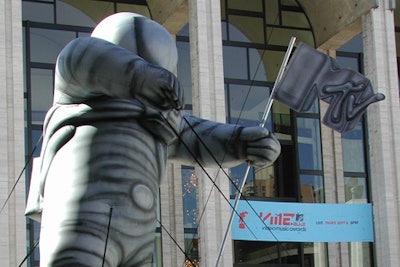
The MTV Video Music Awards have become an institution, with the annual ratings swings and debates over its relevance that go along with such an established enterprise. (It's currently on an upswing: The 2011 broadcast had the biggest ratings in the ceremony's history.)
But when MTV launched the VMAs in 1984, the broadcast was a raucous show from an upstart cable network still finding its footing. From the first incarnation—with Madonna memorably writhing to "Like a Virgin" in front of a giant wedding cake—the focus was on the performances and attention-getting antics, not necessarily the winners.
Those early days of MTV are the subject of a new book, I Want My MTV: the Uncensored Story of the Music Video Revolution, by Craig Marks and Rob Tannenbaum, out today from Dutton. The book is presented as an oral history, with remembrances from more than 400 MTV founders, music executives, and performers. Here are some highlights from the chapter about the VMAs, including stories about hosts who went rogue but who also helped establish the show's anything-goes reputation:
Les Garland, programming executive: Eddie Murphy and I became good buddies, and I got him to host the second VMAs in 1985. He was the biggest star in the world at that point. The night before the show, rehearsal is set for 9 P.M. We had a great rehearsal. And I gave him careful instructions about what he could and couldn't say on TV. The show was being simulcast on Metromedia, which is Fox before it became Fox. I said, "Listen, you have to control the four-letter words, you can't say shit, like you do on pay TV, okay? Promise me?" And he goes, "Don't worry, Garland."
So the next night, he comes out—"Ladies and gentlemen, EDDIE MURPHY!"—and right after he says hello to everybody, he goes off script.
George Bradt, producer: He walks out and goes, "A year ago, I would have said, 'Fuck MTV.' But now I got a video, so I kiss their ass." This was when you could still swear on cable.
Roberta Cruger, talent relations staffer: It was my job to seat everyone at the VMAs. That became very complicated. I had to keep Van Halen separated from David Lee Roth, after they broke up. They had to be in different sections, but one couldn't have a better seat than the other.
Joel Gallen, producer: In 1989, Andrew Dice Clay was the hottest comedian on the planet. He was racy and edgy, MTV was racy and edgy, so we wanted to roll the dice with him, so to speak, and give him a spot. He was fine in rehearsal. Night of the show, the stage manager said to him, "We're running long, you gotta trim your act a little bit." And he didn't react kindly to that. He started saying things he shouldn't say. The Dice incident was fantastic for the VMAs. We wouldn't admit it at the time, but controversy is great. You want people to talk about the show. You want it to be a show where anything can happen, and there's spontaneity and danger.
Arsenio Hall, comedian and host: Dick Clark was producing the show, and he and I were standing in the wings. He had a headset on and I didn't, so I didn't know what Dice was saying. Then I saw Dick throw his headset on the podium. He suggested I pull Dice off the stage. I said, "That's not what I do. I do jokes." I saw Dice last month, and told him I was given the assignment of pulling him off, and we laughed our asses off. I think Dice knew what he was doing. You remembered him the next day.



















